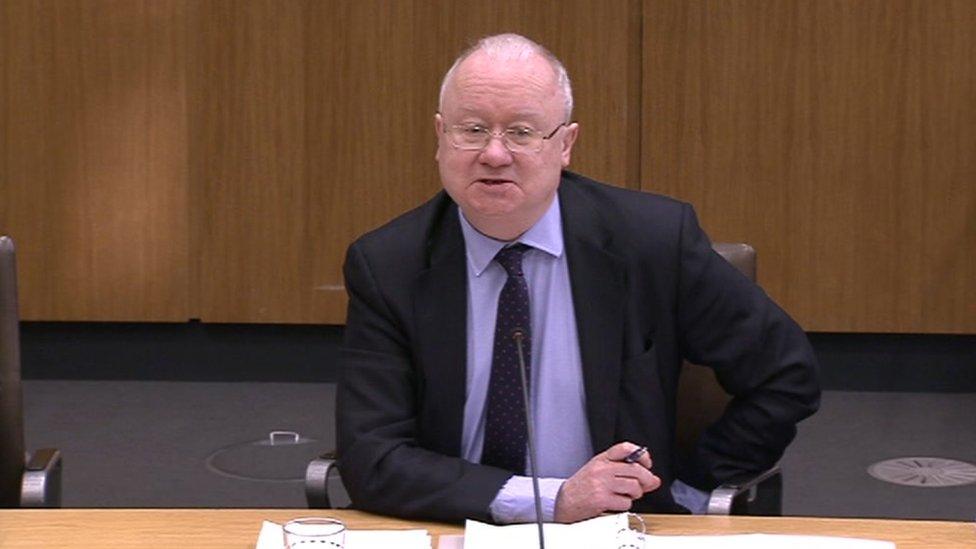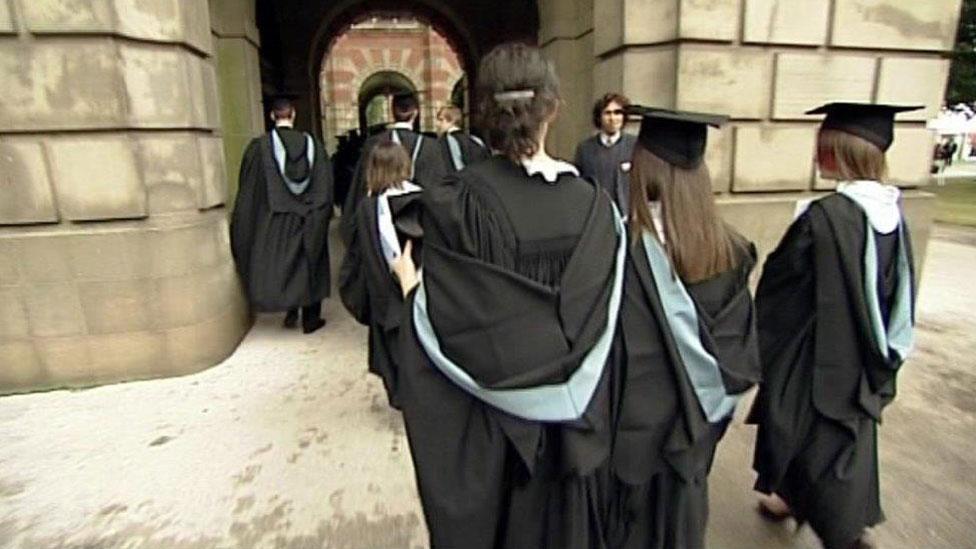Diamond review: The politics of Welsh tuition fees
- Published

The findings of the long-awaited report into student finance in Wales have been published.
Prof Ian Diamond called for fundamental changes, with a shift from support for tuition fees to help with living costs.
It is now for Kirsty Williams, the Liberal Democrat education secretary, and the Labour-led Welsh Government she is part of to decide what to do next.
Tuition fees were widely blamed as a major factor for the Lib Dem's collapse in the 2015 general election at a UK level - but now a consensus has emerged among Wales' politicians that the current system of significant subsidy for students who call Wales home will change.
How did we get here?
In 2010, the Conservative-Liberal Democrat UK government decided universities in England would be able to charge fees of up to £9,000 per year by 2012.
The decision, which prompted protests at the time, affected only universities in England directly but it had a knock-on impact in Wales.
In Wales the then education minister Leighton Andrews allowed for the basic level of tuition fees to be raised to £4,000.
Higher education institutions could charge up to £9,000 provided they could demonstrate a commitment to widening access and other strategic objectives. Universities had to have their fee plans approved.
While universities were allowed to charge the higher fees, a grant was provided for students who were from Wales so they did not have to pay more than £3,900. The rest could be covered by loans.

Mr Andrews said at the time, external: "We are having to raise fees because of the policies of the UK government, which have a distorting impact on our budgets and on the competitive position of Welsh higher education institutions."
The policy drew concerns from opposition politicians that it would likely be unsustainable.
Former Conservative education spokeswoman Angela Burns said the subsidy was a "increasingly uncertain financial commitment for the public purse" - and later said the policy was seeing "tens of millions of pounds of Welsh Government funding to universities outside of Wales".
Worries also came from the higher education sector about the amount of cash heading to English universities as a result and in 2013 Mr Andrews' successor as education minister Huw Lewis commissioned the Diamond review.
Former Welsh Government education advisor, Prof David Reynolds of Swansea University, said the policy had been "brave" and the degree of subsidy was "unique around the planet".
He said: "I think they were trying to help the prospects of lower socio-economic status, more disadvantaged students going to university and I think it was an attempt to show the broader world that Wales was valuing higher education."
He believed there were hints "that maybe the generous subsidy might not have had huge effects on the numbers coming through higher education.
"If resources were available... I think people would have been anxious to stay with what was a trademark, unusual impressive commitment to helping students into higher education and I think people would have stayed with it.
"If there are changes, Welsh Government will do it reluctantly... because they thought, and they were right to think it, that this was a fantastic thing to do to help students in Wales go to HE."

Prior to the Welsh Assembly election last May there was a growing consensus among some of the parties that the tuition fee subsidy would be reformed.
Both the Welsh Conservatives and the Welsh Liberal Democrats - whose former leader Ms Williams is now in charge of implementing tuition fee policy - went into the election with similar commitments to scrap the fee grant and replace it with a system of support for living costs.
Plaid Cymru also pledged to replace the current fee system, but with plans to pay off up to £18,000 of debt for graduates who return to Wales. UKIP, for its part, said it would replace the tuition fee grant with loans for Welsh students choosing to study in England.
Labour also did not say it would continue the current system - Julie James told the BBC before the election the party was not committed to the grant.
She said there may be "nuanced changes" depending on the outcome of the review by Prof Diamond.
Labour won the most seats but not a majority at the election, meaning it and Ms Williams will likely need the support of another party to get any changes through.

Plaid education spokesman Llyr Gruffydd
Opposition parties also could, in theory, block any new policy.
Plaid education spokesman Llyr Gruffydd said: "If I'm persuaded it is a better way of doing it, I won't stand in the way of changing the emphasis towards supporting a maintenance grant system."
He said there was a "huge irony in the fact that the Lib Dems initially said in Westminster that they wouldn't introduce tuition fees, they did so, and now potentially we have a Liberal Democrat cabinet secretary in Wales doing away with the financial support for those paying tuition fees".
He indicated he would accept new proposals if it could be shown they met the criteria of closing the "funding gap" between Welsh and English higher education, being sustainable over the long term, are not dependent on changes made at Westminster, and have a focus on attracting high skilled people to Wales to boost the economy.

Kirsty Williams was appointed Welsh education secretary after the May Senedd election
Peter Black, a former Liberal Democrat AM, said there was a "mild concern" from a "minority" of Lib Dems over Ms Williams potentially implementing a policy which could see tuition fee grants taken away from students.
But he said the Welsh Lib Dems policy of replacing tuition fee grants with support for living costs had been backed by the party membership.
"If Kirsty is able to implement that policy I think she will have 100% support from the party in doing that," the Swansea councillor said.
"Clearly people are nervous because we need to sell that policy properly.
"It is not a concern about anybody breaking promises," he said, arguing that if Ms Williams is able to "we are implementing our manifesto".
It was not clear when Mr Black spoke what Prof Diamond's recommendation would be, but he said he would be happy to go on doorsteps in Welsh student areas "and say to students the Welsh Lib Dems minister is going to giving you x amount in grant every year to help you through your studies, whereas if you were in England you wouldn't get a penny".

Jenny Rathbone
Jenny Rathbone is a backbench Labour AM who serves Cardiff Central - a constituency with the highest proportion of students in the UK.
She said there should be more support for living costs for students from families on low incomes.
"Our concern ought to be everyone should be entitled to go to university if they have got the ability and the income of their family shouldn't be a barrier," she said.
"We have to be realistic about what we can do at the moment. I think the maintenance grant is much more important because the tuition fee is an investment in that persons future.
"The tuition fee is not something they have to pay until much later, until they are earning a reasonable salary."
- Published27 September 2016

- Published27 September 2016

- Published27 September 2016

- Published15 August 2018

- Published18 April 2016

- Published23 September 2016

- Published26 April 2016
